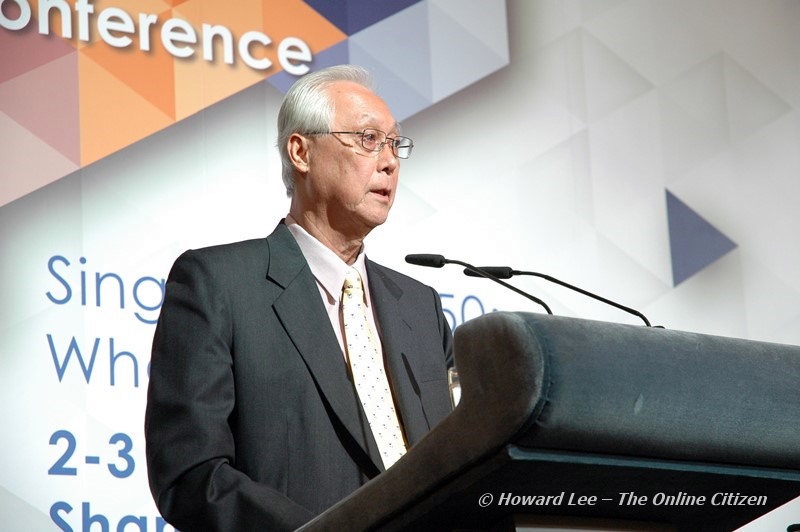PN Balji /
If the results of the May 7 general elections can be described as a shocker, then the Cabinet changes announced yesterday (Wednesday) must be a cracker. And what a cracker it was.
Three minsters who were under severe attack during the campaigning were dropped, a bloated Cabinet of 21 ministers was trimmed down to 17, 11 of the 14 ministries saw changes in their leadership and the average ministerial age came down to 53.
And a couple of election newbies were thrust into office holder positions.
Prime Minister Lee Hsien Loong, who made an uncharacteristic apology during a bruising election battle on behalf of four of his ministers, called the changes “epochal”. And it was so in many ways.
The changes were not just deep, but dramatic too. A political observer said: “I suppose extraordinary times need extraordinary changes.
“The Singapore culture is not to drop ministers in such dramatic fashion. With Minister Mentor Lee Kuan Yew and Senior Minister Goh Chok Tong announcing their resignations last week and the dropping of the three ministers yesterday, this is the first time in my memory that five ministers are leaving at one go.”
Also, the slow motion way of blooding new talent into the Cabinet was thrown to the wind. Election virgins Mr Heng Swee Keat and Major General Chan Chun Sing were made ministers instead of initially testing them in junior positions.
And the government’s long-held belief that they are not in the popularity business was discarded when the strong signals that voters sent on May 7 underpinned nearly every change. They showed their anger at ministerial missteps, a lack of government empathy and a perceived feeling of arrogance by voting against an affable and respected Foreign Minister George Yeo and two other office holders and sending the percentage of votes for the ruling People’s Action Party to a post-independent low of 60.1.
DPM Wong Kang Seng, under whose watch terrorist Mas Selamat escaped, Housing Minister Mah Bow Tan, who became a hated figure because of his ministry’s inability to predict the demand for public flats thus sending prices skyrocketing, and Transport Minister Raymond Lim, who was blamed for over-crowded trains and buses, left the scene.
Those who did well in the elections, like Finance Minister Tharman Shanmugaratnam and Madam Halimah Yaacob, were promoted. Mr Shanmugaratnam became the second Deptuy Prime Minister and Madam Halimah, a Minister of State.
PM Lee said: “I think this is a Cabinet we lined up after the elections. Certainly the outcome of the elections affected my thinking in deciding how to make this Cabinet. I wanted a fresh start, and that’s why I’ve gone for a radical change.”
He said the changes reflect a need to engage the young, who became a major force in the elections. The obsession with the word young/younger was palpable in the short 148-word statement issued by Minister Mentor Lee and Senior Minister Goh. There were six mentions, showing that this group of Singaporeans is becoming a big priority in Singapore politics. The statistics show why: almost one in two voters was born after independence in 1965. And about one in three was born after 1975. The increase in the number of such voters was revealing: by half a million from 2001 to 2011 for the first group and by more than 400,000 for the other group.
The observer said: “With these changes, the Prime Minister has shown that he means business. With a clean slate, he has the best opportunity to make Singapore politics more open and decent. He can re-engage an electorate that displayed its pent-up anger at the ballot box.”
Now that the Cabinet changes have been announced, there is an even taller task ahead: the transformation of the ruling party, which defeated Foreign Minister spoke about. In this election, the party showed its weariness and lack of purpose. The party that had ruled Singapore uninterrupted since 1959 was not cohesive and not on message. On the other hand, the opposition Workers’ Party showed discipline and a sense of purpose.
The PM has time on his hands. He has the next five years to show that he and his new team have learnt the lessons of the 2011 general election. If he does not move boldly and transform the ruling party and his government, the voter backlash will not just be in the form of ripples. The political oasis called Singapore will see a storm, maybe even a tsunami.
The writer is a veteran Singapore journalist and director of the Asia Journalism Fellowship, a joint initiative of Temasek Foundation and Nanyang Technological University.







